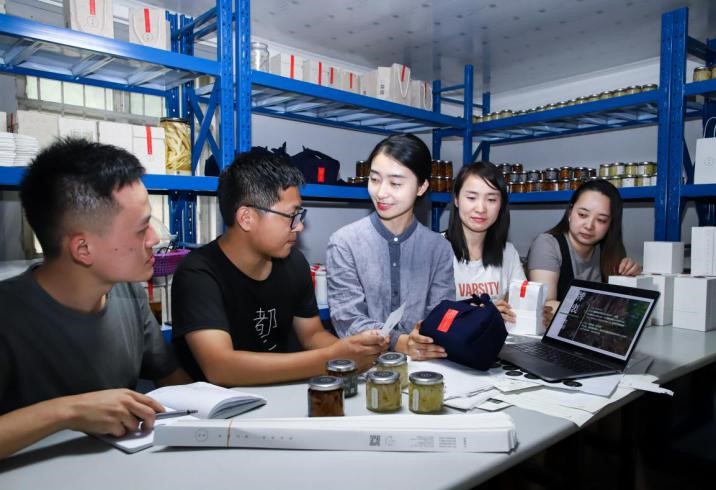China sees 10.1 million people return or move to countryside to start businesses or pursue innovations in 2020
China has witnessed continuous expansion of the number of people who have returned or moved to the countryside to start their own businesses or make innovations, with the size of the group reaching a record high number of 10.1 million last year, an increase of 19 percent from that in 2019.
While marking the largest and fastest growth in the number of people moving back to the countryside to start their own businesses or pursue innovations in China, the year 2020 also witnessed the formation of four major driving forces of entrepreneurship in the country, namely migrant workers, college graduates, ex-servicemen, and women.
At the same time, more than 19 million rural residents who returned to or stayed in their hometowns secured jobs near their homes in 2020, thanks to the efforts of various local governments, which have taken comprehensive measures to effectively cope with the impacts of the COVID-19 pandemic and make overall planning to support people who returned or moved to rural areas to start their own businesses and seek jobs.
Liang Yongying, a woman born in Shanghang county, Longyan city, east China’s Fujian province, returned to her hometown in 2011 after working in Fuzhou, capital of Fujian province for five years since she graduated from a college.
She found that people in her hometown, which has been known as the “land of fish and rice”, were still using traditional cultivation methods and local specialties hadn’t been sold outside of her hometown although modern agriculture was enjoying rapid development.
As the country continuously rolled out favorable policies to support the development of the agricultural sector, rural areas and rural people, Liang eventually decided to return to her hometown to engage in agricultural industry which she has always had a keen interest in.
After returning to her hometown, Liang first became a major grain producer of her hometown, and then owner of a family farm. She has also established a new farmers’ association of Longyan city.
She has realized mechanized and large-scale rice farming through transfer of land-use rights, and set up her own processing factory to provide services for local farmers. The rice from her farm has obtained the green food certification and gradually enjoyed increasing popularity.
Today, her farm offers help to 20 families which used to be registered impoverished households under the “pairing assistance” model every year.
Governments across the country are trying to create more opportunities for people who returned or moved to the countryside to start their own businesses or secure employment.
Various areas of the country have made active efforts to expand the capacity of planting and breeding industries for creating opportunities for entrepreneurs and job hunters, the functional value of rural areas, and the room for improving the efficiency and benefits of industries by focusing on implementing policies on stabilizing employment, creating jobs by boosting development of various industries, optimizing services in providing jobs for residents, and offering vocational training to people to help them upgrade skills or switch jobs.
About 20 percent of the people who returned or moved to the country’s rural areas mainly engage in large-scale and characteristic planting and breeding businesses, seedling cultivation, and livestock and poultry breeding, or lead or co-run farmers’ cooperatives and family farms.
Around 55 percent of these people have established family-owned factories, rural workshops, small and micro businesses and other entities to seek development in such fields as catering, homestay hotels, farm produce preliminary processing, and featured crafts.
The rest 25 percent of the group work as temporary or part-time workers, mainly running small businesses or engaging in temporary jobs.
According to reliable statistics, of all the projects initiated by people who returned or moved to the country’s countryside, 55 percent have tapped into information technology to run online shops, engage in live-steaming shows and direct selling, as well as contactless delivery business, while over 85 percent feature the integration of primary, secondary and tertiary industries and cover a wide range of fields including production, processing, selling, services, and sectors such as agriculture, culture, tourism, and education.
Last year, each project initiated by people who returned or moved to China’s rural areas to start their own businesses or make innovations could provide stable employment for 6.3 people and flexible employment for 17.3 people on average. At the same time, such projects have brought benefits to local farmers based on contracts, in dividend payments, and via shares.
Centering on consolidating and expanding the achievements in poverty alleviation, China is going to further promote the development of rural business projects and cultivate a batch of major entrepreneurship and innovation forces that are rooted in rural areas, create rural industries, and can help local residents increase income, according to Liu Huanxin, vice minister of agriculture and rural affairs.
The country will also establish a batch of demonstration parks and bases for entrepreneurship and innovation in rural areas so as to generate more opportunities and jobs for people who are returning or moving to the countryside, Liu said.
 |
Photos
Related Stories
- New professions help vitalize China’s countryside
- Integrated development brings prosperity to China’s countryside
- Countryside tours gain popularity
- 10m Chinese young people to volunteer in the countryside within three years
- Night view of China's most beautiful countryside
- 'Golden offers' look to draw people back to the countryside
- ‘Beautiful countryside’ key to rural cultural progress
- Countryside scenery in Xiangcheng County of SW China's Sichuan
- Entrepreneurial opportunities bring young Chinese back to countryside
- Artworks on China's countryside generate nostalgia
Copyright © 2021 People's Daily Online. All Rights Reserved.











